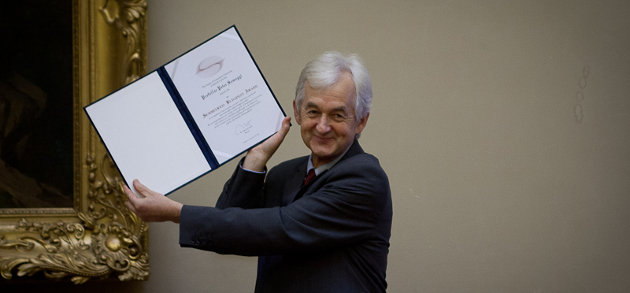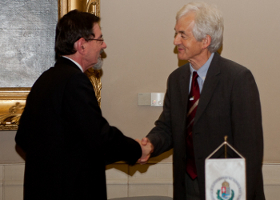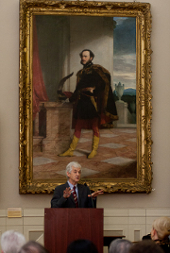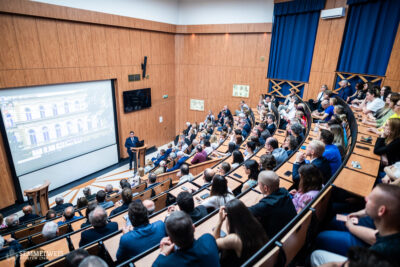Dr. Péter Somogyi, professor of neurobiology and director of the University of Oxford’s Anatomical Neuropharmacology Unit received Semmelweis University’s highest scientific honour, the Semmelweis Budapest Award, at a celebratory symposium held at the Hungarian Academy of Sciences.

In his opening address, Rector Ágoston Szél highlighted: The Szentágothai Memorial Year lays a special emphasis on this joint event of the Hungarian Academy of Sciences and Semmelweis University. “Today, we salute a master who was himself a student of János Szentágothai, and whose own students will soon become masters themselves. The relationship of master and student is two-way: both sides affect the other.”
 As Dr. Ágoston Szél pointed out, this year marks the third time that the Semmelweis Budapest Award has been presented to individuals ranking among the most exceptional scientists. The award recognises the achievements of an international researcher working in the field of medical biology, whose research activities have produced internationally acknowledged results, contributed to the benefit of humanity, and opened up new ways of understanding living natural science.
As Dr. Ágoston Szél pointed out, this year marks the third time that the Semmelweis Budapest Award has been presented to individuals ranking among the most exceptional scientists. The award recognises the achievements of an international researcher working in the field of medical biology, whose research activities have produced internationally acknowledged results, contributed to the benefit of humanity, and opened up new ways of understanding living natural science.
In his laudation, Vice-Rector László Hunyady provided a brief overview of the world-famous brain researcher’s work.
Dr. Péter Somogyi has been conducting pioneering research into the chemical identification of neuronal types and localisation of signalling molecules in identified microcircuits, examining the process of thinking, making memories, and the brain’s ability to process information. He is director of the University of Oxford’s Anatomical Neuropharmacology Unit, and the first Hungarian member of the Royal Society of London. Currently, he is researching the temporal relationship between behaviour and events taking place in the brain. The methods introduced by Dr. Somogyi have been widely adopted around the world. His exceptional work has been recognised through numerous international awards. In 2011, Dr. Somogyi and two other Hungarian scientists – his former student Dr. György Buzsáki and Dr. Tamás Freund – became the first recipients of the Brain Prize, touted as the Nobel Prize of brain researchers.
 At the celebratory symposium held in honour of the occasion, Dr. Péter Somogyi related that he has always looked upon Semmelweis University as his second alma mater. When he began working at the University’s Department of Pathology in 1971, he didn’t even dream that an ordinary biologist could one day receive a Semmelweis award.
At the celebratory symposium held in honour of the occasion, Dr. Péter Somogyi related that he has always looked upon Semmelweis University as his second alma mater. When he began working at the University’s Department of Pathology in 1971, he didn’t even dream that an ordinary biologist could one day receive a Semmelweis award.
Following his celebratory lecture, Dr. Somogyi stressed the responsibility of supporting the researchers and talents of the future, announcing his intention to dedicate his €10,000 monetary prize to establish a scholarship foundation at Semmelweis University, supporting exceptionally talented young researchers. He outlined that the foundation, which bears the name of Stephen W. Kuffler (1913-1980), Hungarian-born Harvard University professor, was founded by seven scientists, including three Nobel Laureates. Dr. E. Szilveszter Vizi, former president of the Hungarian Academy of Sciences, is among its founding members.
The Semmelweis Budapest Award has been presented three times since its foundation by the University Senate in 2009. Dr. Jeremy K. Nicholson, professor at Imperial College London, was the first recipient of the award in 2010. Last year, the distinction went to Sir George Radda, Hungarian-born father of the MRI.
Zsuzsa Szuchy
Translated by Gina Varga-Gönczi


